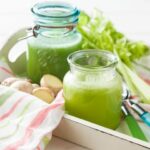Juice Tips and Tricks
How Long Is Fresh Pineapple Juice Good In The Fridge

I frequently think about the shelf life of freshly squeezed pineapple juice in the refrigerator as a fan of it. The last thing I want is to get sick from consuming spoiled juice.
So, I did some research and found out exactly how long fresh pineapple juice can last and how to keep it fresh for as long as possible.
Fresh pineapple juice is not only delicious but also packed with nutritional benefits. It contains high levels of vitamin C, manganese, and bromelain, an enzyme that aids digestion and reduces inflammation.
However, the shelf life of fresh pineapple juice is relatively short compared to other juices, and it can quickly spoil if not stored properly.
In this article, I will explore the shelf life of fresh pineapple juice, how to store it, and how to tell if it has gone bad.
Key Takeaways
- Fresh pineapple juice typically lasts 2-4 days in the fridge.
- Appearance, smell, and taste are key indicators of spoilage.
- Fresh pineapple juice should not be stored for longer than 5-7 days.
- Frozen pineapple juice can last up to 6 months.
The Nutritional Benefits of Fresh Pineapple Juice
You’ll love how fresh pineapple juice packs a punch of nutrients, like vitamin C and bromelain, that can boost your immunity and aid digestion. Not only does it taste delicious, but it’s also a great source of antioxidants that can help protect your body from harmful free radicals.
Pineapple juice is also high in manganese, which is essential for bone health and metabolism. When it comes to making fresh pineapple juice, there are a variety of health benefits to enjoy. You can use it as a base for smoothies, or drink it on its own for a refreshing and nutritious beverage.
Some recipe ideas include combining pineapple juice with coconut water for a tropical twist, or adding in ginger for an extra zing. With so many options available, it’s easy to incorporate fresh pineapple juice into your diet and reap its many benefits.
Speaking of benefits, let’s talk about how long fresh pineapple juice stays fresh in the fridge.
The Shelf Life of Fresh Pineapple Juice
Hey, did you know that the clock is ticking on the life of your homemade pineapple juice? As much as we love our pineapple juice recipes and the health benefits of pineapple juice consumption, fresh pineapple juice has a limited shelf life.
Here are some things you should know to ensure that you make the most of your juice:
- Fresh pineapple juice is highly perishable. Once you’ve extracted the juice, it will immediately start to lose its nutritional value and flavor.
- The shelf life of fresh pineapple juice is typically 2-4 days when stored in the refrigerator.
- Pineapple juice will last longer in the freezer, but it’s important to note that it will lose some of its nutritional value.
Given the short shelf life of fresh pineapple juice, it’s important to store it properly to maximize its freshness and flavor. So, how do you store fresh pineapple juice?
How to Store Fresh Pineapple Juice
Properly storing homemade pineapple juice is crucial to preserving its nutritional benefits and delicious flavor. The right storage method can extend the shelf life of fresh pineapple juice for up to five days in the refrigerator. To keep the juice fresh for as long as possible, it is essential to use the best containers and freezing techniques.
When it comes to storing fresh pineapple juice, glass containers are the best option. Glass is non-reactive, which means it won’t interact with the juice and change its flavor. Additionally, glass is airtight, which helps to keep the juice fresh for a more extended period. If you don’t have a glass container, you can use plastic, but make sure it’s food-grade and free of BPA. Another important tip is to keep the pineapple juice in the fridge as soon as possible after juicing it to prevent bacterial growth.
| Container Type | Pros | Cons |
|---|---|---|
| Glass | Non-reactive, airtight, keeps juice fresh longer | Breakable, heavier, more expensive |
| Plastic (food-grade, BPA-free) | Lightweight, affordable, shatterproof | Can absorb flavors, not airtight, not as durable as glass |
If you want to keep your pineapple juice fresh for longer, you can also freeze it. Pour the juice into an airtight container, leaving some space at the top, as the juice will expand when it freezes. Place the container in the freezer and thaw it in the fridge when you’re ready to drink it. However, keep in mind that freezing can affect the texture and flavor of the juice.
Knowing how to properly store fresh pineapple juice is key to getting the most out of this refreshing beverage. However, even with the best storage methods, pineapple juice can still spoil. In the next section, I’ll discuss the signs of spoilage to help you identify when your juice has gone bad.
Signs of Spoilage
When it comes to determining if fresh pineapple juice has spoiled, there are three key factors to consider: appearance, smell, and taste. As someone who regularly prepares and stores fresh juice, I’ve learned to pay close attention to these indicators in order to ensure that I’m consuming safe and flavorful juice.
By being attuned to changes in color, texture, aroma, and flavor, I can quickly identify any signs of spoilage and avoid consuming juice that has gone bad.
Appearance
You can tell if your fresh pineapple juice has gone bad by checking its appearance – if it looks cloudy or has any mold, it’s time to toss it out. Pineapple juice, like any fruit juice, can spoil over time, especially if it’s not stored properly. To ensure that your juice stays fresh for as long as possible, it’s important to keep it refrigerated and consume it within a few days of making it.
One way to get the most out of your pineapple is to use the core, which is often discarded. The core contains most of the fruit’s fiber and a good amount of its nutrients, making it a great addition to smoothies or juices. There are also plenty of recipes out there that incorporate fresh pineapple juice, such as marinades, cocktails, and even desserts. By using the juice in a variety of ways, you can make sure that none of it goes to waste. Now, let’s move on to the next step, which is checking the smell of your pineapple juice.
Smell
If your pineapple juice smells sour or rancid, it’s likely gone bad and should be discarded. The smell test is one of the easiest ways to determine if your juice is still good.
Pineapple juice that has been stored at the wrong temperature or for too long can start to ferment, which causes it to develop an unpleasant odor. This is why it’s important to make sure you always store your pineapple juice in the fridge, at a temperature of 40°F or below.
To ensure that your pineapple juice stays fresh for as long as possible, here are some tips to keep in mind:
- Always store your juice in an airtight container to prevent exposure to oxygen, which can speed up the spoilage process.
- Don’t store your juice for longer than 5-7 days, even if it still smells okay. After this time, the juice may start to lose its flavor and freshness.
- If you notice any mold or unusual growth in your juice, discard it immediately.
- Make sure your fridge is set to the correct temperature to prevent spoilage. A refrigerator thermometer can help you monitor the temperature.
- If you’re unsure about the freshness of your juice, always err on the side of caution and throw it out.
If your pineapple juice has passed the smell test, the next step is to give it a taste to see if it’s still good.
Taste
Tasting the fermented notes in your stored pineapple juice can offer a unique and unexpected flavor profile to your drinks and recipes. However, it’s important to note that the taste of the juice will change as it ages.
Fresh pineapple juice has a sweet and tangy flavor, but as it sits in the fridge, the natural sugars in the juice will start to break down, causing the juice to become more acidic and sour. The longer you store the juice, the more pronounced this taste will become.
Despite the change in flavor, there are still many mixing options and serving suggestions that can make use of aged pineapple juice. The sourness of the juice can be balanced out by adding a sweetener, such as honey or agave syrup, or by mixing it with other fruits or juices. Aged pineapple juice can also be used in marinades and sauces, adding a tangy flavor to your dishes.
Factors that affect the shelf life of pineapple juice include storage temperature, exposure to air, and the presence of preservatives.
Let’s explore these factors in more detail in the next section.
Factors That Affect Shelf Life
When storing fresh pineapple juice in the fridge, factors such as temperature and exposure to air can greatly affect its shelf life, so it’s important to keep these in mind.
Pineapple juice is a delicate beverage that can spoil quickly if not stored correctly. Factors affecting flavor, such as oxidation and microbial growth, can cause the juice to become sour and unappetizing. To make pineapple juice last longer, consider the following:
- Keep the juice in an airtight container to prevent exposure to air.
- Store the juice at a temperature between 32°F to 40°F to slow down microbial growth.
- Avoid storing the juice near other fruits, vegetables, or meat that may release ethylene gas, which can speed up the ripening process and cause spoilage.
- Use the juice within a week of purchase to ensure freshness.
- Freeze the juice in ice cube trays if you have excess, as frozen juice can last up to 6 months.
By following these guidelines, you can ensure that your fresh pineapple juice lasts longer and maintains its delicious taste.
In the next section, I’ll provide tips for extending the shelf life of pineapple juice beyond these basic measures.
Tips for Extending Shelf Life
To make your pineapple juice last longer and avoid spoilage, you should try storing it in small, portioned containers that can easily fit in your freezer. This will help preserve the freshness and taste of your juice for up to six months.
Additionally, you can also try adding pineapple waste to your compost or using it in creative pineapple juice recipes, such as a refreshing pineapple and mint smoothie or a tropical pineapple and coconut cocktail.
When it comes to determining if your fresh pineapple juice has gone bad, there are a few key things to look out for. Keep an eye on the color and consistency of the juice, as well as any unusual smells or tastes. If you notice any changes, it’s best to err on the side of caution and discard the juice to avoid any potential health risks.
How to Tell If Fresh Pineapple Juice Has Gone Bad
If you’re wondering whether your pineapple juice has turned bad, keep an eye out for changes in color, texture, smell, or taste. Here are three things to look for:
-
Mold or yeast growth – If you see any signs of fuzzy growth, discard the juice immediately. It can pose a health risk and make you sick.
-
Off-putting odor – Fresh pineapple juice has a sweet, tropical smell. If it smells sour or rancid, it’s past its prime.
-
Change in flavor – Pineapple juice should taste sweet and tangy. If it tastes bitter, sour, or flat, it’s gone bad.
If your fresh pineapple juice has gone bad, there are still ways to repurpose it. You can use it as a marinade for meat, add it to smoothies or cocktails, or make a DIY pineapple juice face mask recipe.
But if you’re not interested in repurposing it, the next section will cover how to dispose of it properly.
How to Dispose of Spoiled Pineapple Juice
Properly disposing of spoiled pineapple juice involves pouring it down the drain or toilet, making sure to flush it with plenty of water to prevent any lingering odors. It’s important to avoid any contact with the skin or eyes, as spoiled juice can cause irritation.
If you’re looking for more eco-friendly disposal options, consider composting the pineapple juice along with other organic waste in your garden.
If you’re feeling creative, there are also alternative uses for spoiled pineapple juice. One option is to use it as a marinade for meats such as chicken or pork. The acidity of the juice can help tenderize the meat and add a tropical flavor.
Additionally, you can use the juice in baking recipes such as pineapple upside-down cake or muffins. By getting creative, you can avoid wasting the juice and turn a potential problem into a delicious solution.
Alternative Uses for Spoiled Pineapple Juice
Now that we know how to properly dispose of spoiled pineapple juice, let’s talk about its potential uses. Don’t throw that bottle away just yet!
Spoiled pineapple juice can still be put to good use in a variety of creative recipes. One option is to use it as a marinade for meats such as chicken or pork. The acidity of the juice can help tenderize the meat and add a sweet and tangy flavor.
Another idea is to mix it with other juices or sparkling water to create a refreshing tropical drink. You can even use it as an ingredient in baking, such as adding it to muffins or cakes for a unique twist. With a little creativity and experimentation, there are endless possibilities for incorporating spoiled pineapple juice into your cooking and baking.
Frequently Asked Questions
Can I freeze fresh pineapple juice to extend its shelf life?
Yes, I recommend freezing fresh pineapple juice to extend its shelf life. It’s perfect for use in Pineapple juice cocktails. Make sure to store it in an airtight container and consume within 3 months for optimal taste and quality.
How long does it take for fresh pineapple juice to spoil if left out of the fridge?
If fresh pineapple juice is left out of the fridge, it can spoil quickly at room temperature due to the presence of bacteria. To avoid spoilage, refrigerate within two hours of juicing or use preserving techniques such as canning or freezing.
What are some common recipes that use fresh pineapple juice as an ingredient?
Pineapple juice cocktails make for a refreshing and healthy drink option. Drinking fresh pineapple juice provides a wealth of benefits, including improved digestion and a boost to the immune system. Try incorporating it into smoothies or as a mixer in your favorite cocktails.
Is there a difference in shelf life between homemade and store-bought fresh pineapple juice?
I have found that there is a difference in shelf life between homemade and store-bought fresh pineapple juice. While both options offer nutritional benefits, homemade juice may have a fresher flavor due to the lack of preservatives.
Can I mix fresh pineapple juice with other fruit juices to create a unique flavor?
I enjoy experimenting with different Pineapple juice pairings to create unique flavors. Mixing it with orange or cranberry juice adds a refreshing twist. However, it’s important to keep in mind the natural sweetness of the pineapple juice when selecting other fruits.
Conclusion
Well, that’s all you need to know about fresh pineapple juice and its shelf life. As someone who loves drinking this delicious and healthy juice, I always make sure to store it properly and consume it before it goes bad.
And now that I’ve shared all this information with you, I hope you’ll do the same. But before I go, let me share one interesting statistic that I came across during my research.
Did you know that according to the United Nations, pineapples were the most traded tropical fruit in the world in 2019? That’s right, this spiky fruit is not only popular among consumers but also among traders and exporters.
So, the next time you enjoy a glass of fresh pineapple juice, remember that you’re not alone in your love for this tropical fruit.
Cindy thoroughly researches juicing trends, techniques, and recipes to provide readers with practical advice and inspiration. Her writing style is accessible, engaging, and designed to make complex concepts easy to understand. Cindy’s dedication to promoting the advantages of juicing shines through her work, empowering readers to make positive changes in their lives through the simple act of juicing.
Juice Tips and Tricks
How to Make Aloe Vera Juice Taste Better

Tired of the strong flavor of aloe vera juice? No problem, we’ve got the answer for you.
In this article, we’ll share some tips and tricks to make your aloe vera juice taste better. We have tried and tested various methods to enhance the flavor without compromising the health benefits.
From choosing the right juice to adding natural sweeteners and infusing with fruits and herbs, we’ve got all the information you need to transform your aloe vera juice into a delightful and refreshing beverage.
Let’s dive in!
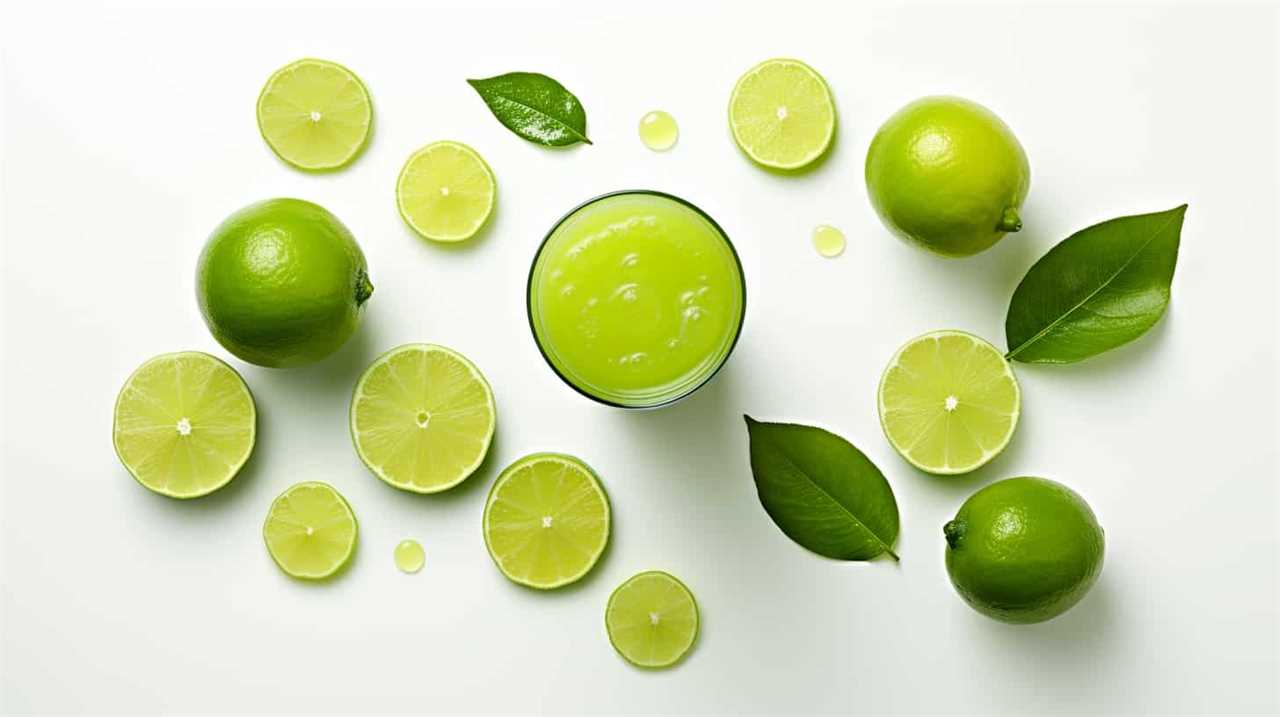
Key Takeaways
- Choose a reputable brand of aloe vera juice that prioritizes quality and uses organic, pure aloe vera.
- Avoid brands that contain added sugars or artificial ingredients.
- Use natural sweeteners like honey, agave syrup, or stevia to enhance the taste of aloe vera juice.
- Experiment with adding fruits, herbs, and other juices to create unique flavor combinations and enhance the health benefits of aloe vera juice.
Choosing the Right Aloe Vera Juice
We can enhance our experience with aloe vera juice by selecting the right brand and type for our preferences. When it comes to finding a reputable brand, it’s important to do some research and read reviews from other consumers. Look for brands that prioritize quality and use organic, pure aloe vera without any added sugars or artificial ingredients. Understanding the health benefits of aloe vera juice is also crucial in making the right choice. Aloe vera is known for its soothing properties, aiding digestion, promoting skin health, and boosting the immune system. By choosing a high-quality brand, we can ensure that we’re getting the maximum benefits from our aloe vera juice.
Now that we know how to choose the right brand, let’s move on to the next step of adding natural sweeteners.
Adding Natural Sweeteners
To enhance the flavor of our aloe vera juice, we can add natural sweeteners such as honey or agave syrup. Using alternative sweeteners not only adds sweetness but also brings unique flavors to the juice. Here are some options to consider:
- Stevia: A natural sweetener derived from the Stevia plant, it’s a zero-calorie alternative to sugar.
- Maple Syrup: This natural sweetener adds a rich and earthy flavor to the aloe vera juice.
- Dates: Pureed dates can be used to sweeten the juice while also providing essential nutrients like fiber.
In addition to using alternative sweeteners, we can enhance the flavor of aloe vera juice by adding spices and extracts. Cinnamon, ginger, or vanilla extract can add warmth and depth to the taste. By experimenting with different combinations of these natural sweeteners, spices, and extracts, we can create a flavor profile that suits our preferences.
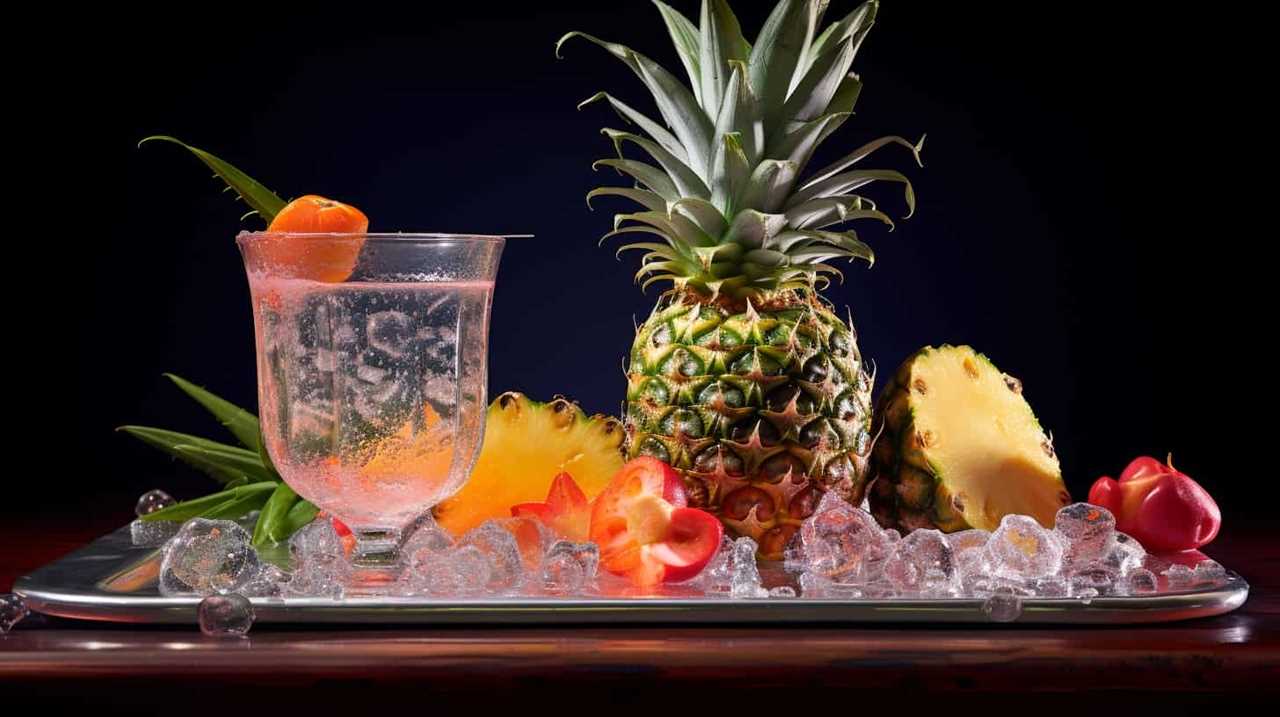
Now, let’s move on to the next section and learn how to infuse aloe vera juice with fruits and herbs to further enhance its taste.
Infusing With Fruits and Herbs
As we explore ways to make our aloe vera juice taste better, one option to consider is infusing it with fruits and herbs. Creating unique aloe vera blends by adding fruits and herbs not only enhances the flavor but also adds a touch of freshness and complexity to the juice.
Fruits like strawberries, pineapple, or citrus can add a burst of sweetness, while herbs like mint, basil, or ginger can provide a subtle yet refreshing twist. Exploring the benefits of herbal infusions can also be beneficial for our health. For example, adding a few sprigs of lavender can promote relaxation and reduce stress. Additionally, infusing aloe vera juice with rosemary can aid digestion and boost the immune system.
Blending With Other Juices
Let’s try mixing aloe vera juice with different fruit juices to create delicious and refreshing blends. Blending aloe vera juice with other fruits not only enhances its taste but also adds nutritional benefits to your drink. Here are three fruit juices that you can mix with aloe vera juice:

- Orange juice: Combining aloe vera juice with orange juice not only adds a tangy flavor but also boosts your intake of vitamin C, which is essential for a strong immune system.
- Pineapple juice: Mixing aloe vera juice with pineapple juice creates a tropical blend that isn’t only refreshing but also helps in digestion. Pineapple contains bromelain, an enzyme that aids in breaking down proteins and promoting better digestion.
- Watermelon juice: Blending aloe vera juice with watermelon juice creates a hydrating and refreshing combination. Watermelon is rich in water content and contains electrolytes that can help replenish your body’s fluids.
Experimenting With Flavor Combinations
While we can try various flavor combinations with aloe vera juice, it’s important to find the right balance to enhance its taste. Experimenting with different flavors can’t only make the juice more enjoyable but also enhance its health benefits.
Aloe vera juice is known for its numerous health benefits, such as boosting digestion, promoting hydration, and supporting the immune system. By adding complementary flavors, we can create a refreshing summer drink that not only tastes great but also provides a nutritional boost.
Some popular flavor combinations include mixing aloe vera juice with citrus fruits like lemon or orange, adding a splash of coconut water for a tropical twist, or combining it with cucumber and mint for a refreshing and cooling effect.
Don’t be afraid to get creative and find the flavor combination that suits your taste buds best!
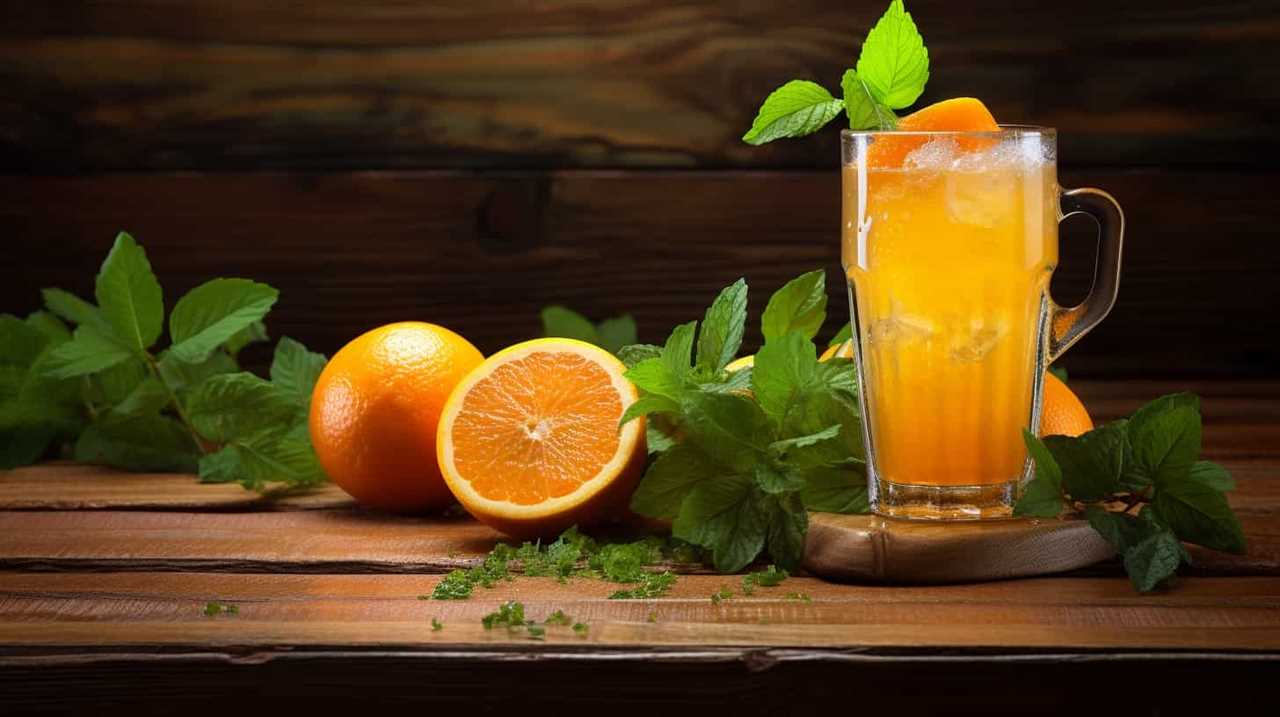
Frequently Asked Questions
Can I Use Store-Bought Aloe Vera Gel Instead of Fresh Aloe Vera for Making Juice?
Yes, you can use store-bought aloe vera gel instead of fresh aloe vera for making juice. However, it’s important to note that fresh aloe vera juice may have more health benefits due to its higher nutrient content.
How Long Can I Store Aloe Vera Juice in the Refrigerator?
Aloe vera juice can be stored in the refrigerator for up to a week. Refrigeration helps maintain the longevity and freshness of the juice, preserving its beneficial properties.
Can Aloe Vera Juice Help With Digestive Issues?
Aloe vera juice can potentially help with digestive issues when taken in appropriate dosages. However, it is important to note that there may be potential side effects. It is always best to consult with a healthcare professional before starting any new supplement regimen.
Can I Use Artificial Sweeteners Instead of Natural Sweeteners in My Aloe Vera Juice?
Using artificial sweeteners in aloe vera juice may affect its taste and potential health benefits. However, natural sweeteners like honey or stevia can enhance the flavor without compromising its nutritional value.

Is It Safe to Drink Aloe Vera Juice Every Day?
Drinking aloe vera juice daily can have numerous benefits, such as improving digestion and boosting the immune system. However, consuming it regularly may also lead to potential side effects like diarrhea or stomach cramps.
Conclusion
In conclusion, making aloe vera juice taste better is easy and enjoyable.
By choosing the right aloe vera juice and adding natural sweeteners, infusing with fruits and herbs, blending with other juices, and experimenting with flavor combinations, you can create a delightful and refreshing drink.
So go ahead and unleash your creativity in the kitchen, and transform your aloe vera juice into a sensational elixir that will transport your taste buds to paradise.
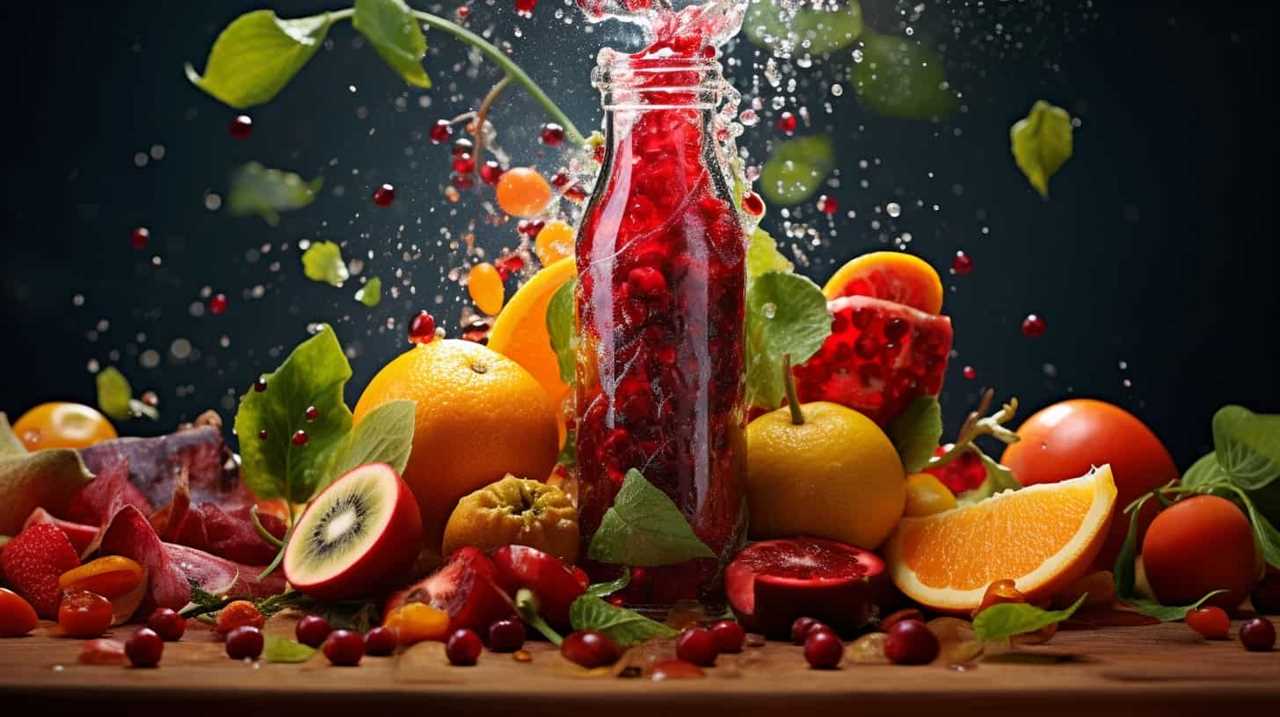
Susannah expertise lies in researching and compiling evidence-based content on juicing, nutrition, and overall health. She is committed to ensuring that The Juicery World offers accurate, up-to-date, and trustworthy information to empower readers to take control of their health. Susannah’s goal is to inspire individuals to embrace juicing as a way to nourish their bodies and live their best lives.
Juice Tips and Tricks
How to Make a Glass of Lemonade With Bottled Lemon Juice

Are you craving a cool glass of lemonade to quench your thirst? Look no further! Try out our perfect recipe using bottled lemon juice that will surely please your taste buds.
In this article, we’ll guide you through the process of creating a tangy and sweet concoction that will leave you feeling refreshed and satisfied.
So grab your ingredients and let’s get started on this delightful journey of serving ourselves and others a glass of pure lemony goodness.
Key Takeaways
- Consider the storage of the bottled lemon juice (dark glass or plastic bottles, protect from light exposure, check expiration date)
- Choose a suitable pitcher and fresh lemons for enhanced flavor
- Store the lemonade concentrate in the refrigerator to maintain freshness
- Adjust the sweetness and tartness to taste with sugar or more lemon juice, and experiment with different sweeteners or additional flavors.
Choosing the Right Bottled Lemon Juice
What are the key factors we should consider when selecting the right bottled lemon juice for our lemonade?

One important factor is how the lemon juice is stored. Look for bottles that are made of dark glass or plastic, as they help protect the juice from light exposure, which can degrade its quality. It’s also important to check the expiration date to ensure freshness.
Another benefit of using bottled lemon juice is convenience. It saves time and effort compared to squeezing fresh lemons. Additionally, bottled lemon juice provides consistent flavor, as the acidity levels are standardized.
When selecting a brand, consider reading reviews and checking for certifications, such as organic or non-GMO.
Gathering the Necessary Ingredients and Tools
How can we gather all the necessary ingredients and tools to make a glass of lemonade with bottled lemon juice?
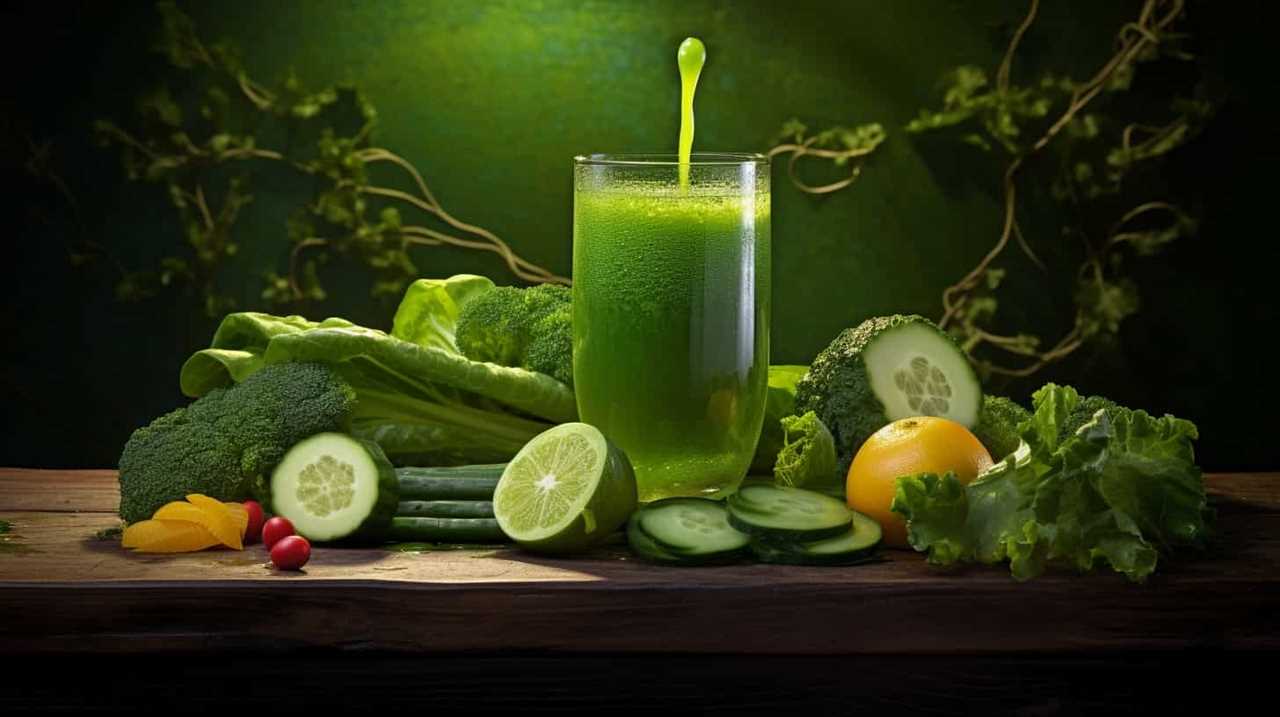
It’s important to start with the right pitcher. Look for a pitcher that’s made of glass or BPA-free plastic, as these materials won’t affect the taste of the lemonade. The pitcher should also have a lid or cover to keep the lemonade fresh and prevent spills.
Now, let’s talk about the lemons. While bottled lemon juice is convenient, using fresh lemons instead can elevate the flavor of your lemonade. Choose lemons that are firm and have a bright yellow color. Give them a gentle squeeze to ensure they’re juicy. To extract the juice, you’ll need a citrus juicer or a reamer. These tools make it easy to get every last drop of juice from the lemons.
Mixing the Lemonade Concentrate
To start mixing the lemonade concentrate, we’ll slowly pour the bottled lemon juice into the pitcher. It’s important to choose the right container for the lemonade concentrate. A pitcher with a lid or a tightly sealed container will help maintain the freshness and prevent any spills or leaks. Once the lemon juice is in the pitcher, we can move on to the next step of adding water and sweetener.
To ensure the lemonade concentrate stays fresh, it’s essential to store it properly. Keep the pitcher in the refrigerator to maintain its cool temperature and prevent any bacteria growth. If you have any leftover concentrate, transfer it to a smaller container with an airtight lid before refrigerating. This will help retain its flavor and prevent any contamination.
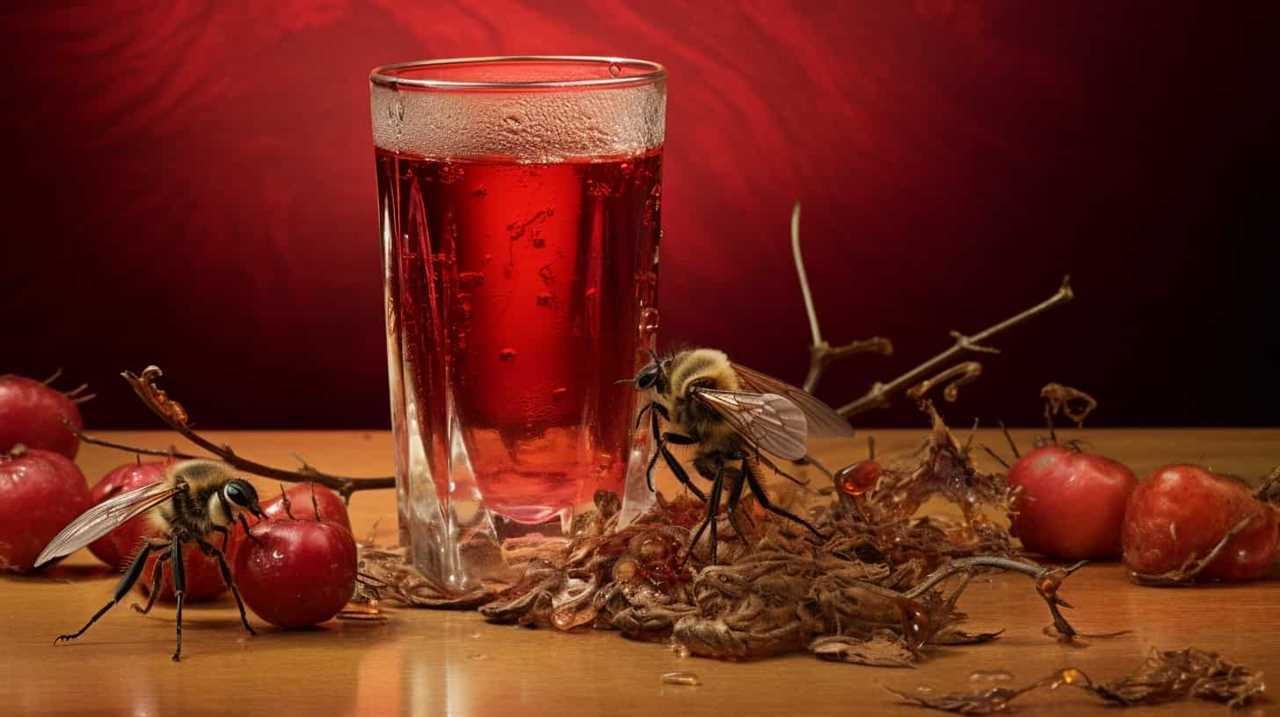
Now that we’ve mixed the lemonade concentrate, it’s time to adjust the sweetness and tartness to taste.
Adjusting the Sweetness and Tartness to Taste
We can adjust the sweetness and tartness of the lemonade to taste by adding more sugar or lemon juice, respectively. If you prefer a sweeter lemonade, simply add more sugar and stir until it dissolves completely. You can experiment with different sweeteners such as honey or agave syrup to find the perfect balance of sweetness.
On the other hand, if you want a tangier lemonade, add more lemon juice gradually, tasting as you go until it reaches your desired level of tartness.
Additionally, you can get creative with your lemonade by adding flavors like fresh mint leaves or a hint of lavender. These additions can elevate the flavor profile and create a more refreshing and unique experience.

Now that we’ve adjusted the sweetness and tartness of our lemonade, let’s move on to serving and enjoying your refreshing glass of lemonade.
Serving and Enjoying Your Refreshing Glass of Lemonade
Now let’s sit back, relax, and savor our refreshing glass of lemonade.
When it comes to serving and enjoying this delightful drink, there are a few techniques and garnishing options to consider.
Firstly, serving your lemonade chilled is essential for maximum enjoyment. Ensure that you have chilled glasses or add ice cubes to the glasses before pouring the lemonade.

To add a touch of elegance, you can garnish your lemonade with a slice of lemon on the rim of the glass. For an extra burst of flavor, you could also add a sprig of fresh mint or a few berries.
Remember to gently stir the lemonade before serving to evenly distribute the flavors.
Now, take a sip, feel the refreshing tang of lemon, and let the sweet and tart flavors dance on your taste buds.
Cheers!
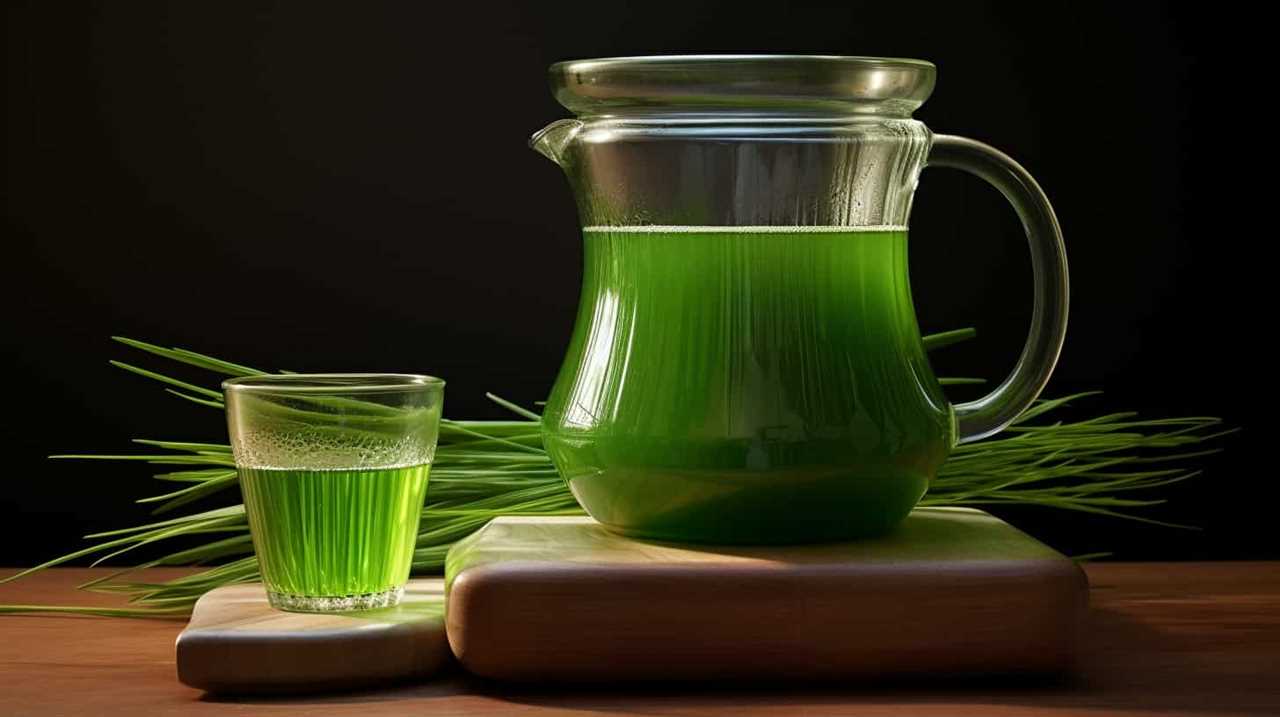
Frequently Asked Questions
Can I Use Fresh Lemons Instead of Bottled Lemon Juice?
Fresh lemons offer numerous benefits over bottled lemon juice. The taste of fresh lemons is unparalleled, providing a vibrant and tangy flavor. Incorporating fresh lemons into your lemonade will elevate its taste and give it a refreshing and authentic twist.
Can I Substitute Sugar With a Different Sweetener?
Substituting sweeteners in lemonade can enhance the flavor and offer health benefits. We’re knowledgeable about alternative sweeteners and can provide precise, detailed instructions on using them in place of sugar.
How Long Does the Lemonade Concentrate Need to Chill in the Refrigerator?
The chilling time for the lemonade concentrate in the refrigerator is typically around 1-2 hours. Using bottled lemon juice offers the benefit of convenience and consistent flavor for a refreshing glass of lemonade.
Can I Add Other Fruits or Flavors to the Lemonade?
Sure, we can definitely add different fruits or flavors to our lemonade. It’s a great way to experiment with unique flavors and create refreshing, personalized drinks. The possibilities are endless!

How Long Does the Lemonade Stay Fresh in the Refrigerator?
Lemonade made with bottled lemon juice can stay fresh in the refrigerator for about 5-7 days. To maximize shelf life, store it in an airtight container and keep it chilled.
Conclusion
And so, with a few simple steps and the right ingredients, a glass of refreshing lemonade is born.
Like a symphony of flavors dancing on your taste buds, this tangy elixir quenches thirst and brings joy on a hot summer day.
Just a sip transports you to a world of citrusy delight, where the sweetness and tartness blend harmoniously.

So go ahead, indulge in the art of lemonade-making and savor every drop of this sun-kissed nectar.
Cheers to the perfect glass of lemonade!
Susannah expertise lies in researching and compiling evidence-based content on juicing, nutrition, and overall health. She is committed to ensuring that The Juicery World offers accurate, up-to-date, and trustworthy information to empower readers to take control of their health. Susannah’s goal is to inspire individuals to embrace juicing as a way to nourish their bodies and live their best lives.
Juice Tips and Tricks
How to Know if Orange Juice Is Bad

We’ve all been in that situation before – reaching for a glass of orange juice and hesitating, unsure if it’s still okay to drink. Fear not! This article will give you the knowledge you need to determine for sure if your orange juice is still fresh or if it’s gone bad.
With a blend of scientific precision and practical tips, we’ll explore color changes, strange smells, off taste, texture changes, and mold or growth that may indicate spoilage.
Let’s dive in and serve ourselves a refreshing glass of certainty!
Key Takeaways
- Color changes in orange juice can indicate a loss of freshness and shelf life extension, but it doesn’t necessarily mean the juice is bad.
- Unusual or off-putting odors in orange juice, such as sour or fermented scents, can be a sign of poor quality.
- An off taste in orange juice, such as sour, bitter, or fermented flavors, suggests that the juice is spoiled.
- Texture changes in orange juice, such as pulp separation or a thicker consistency, can occur as the juice ages, so it’s important to consume it before the expiration date.
Color Changes in Orange Juice
We should be aware that color changes can indicate whether orange juice is bad.
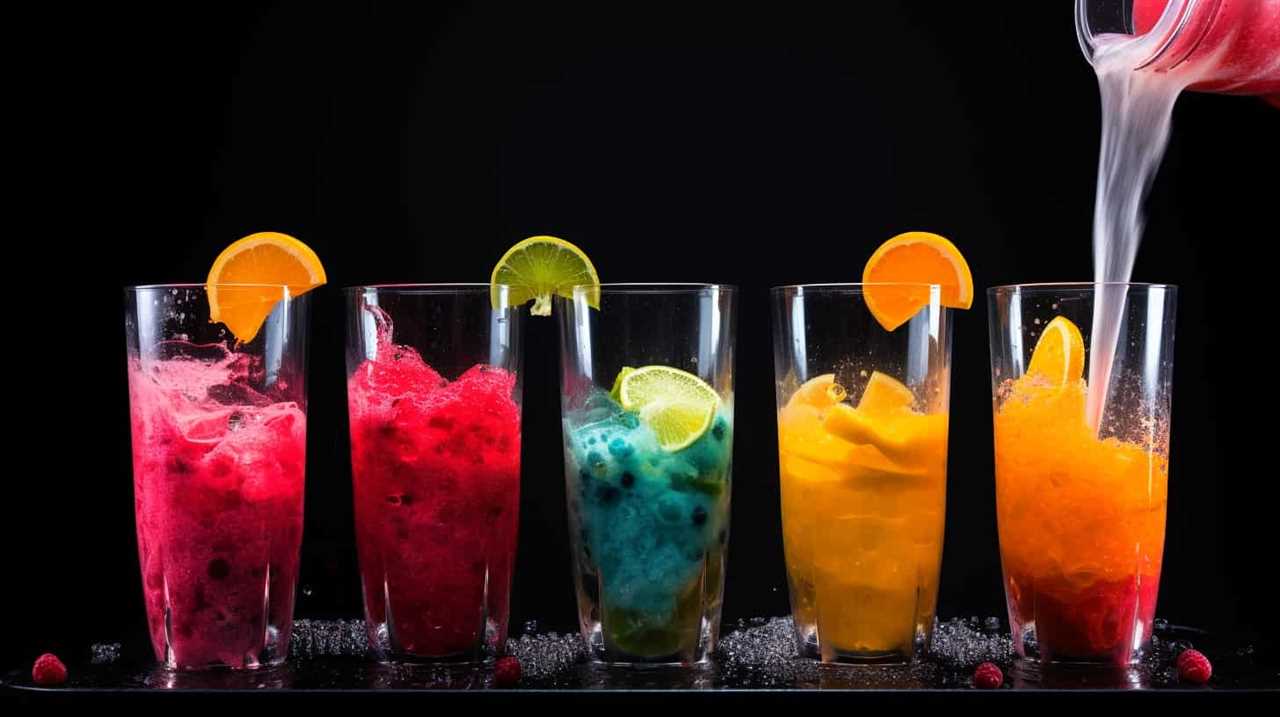
When it comes to orange juice, color is a crucial factor to consider. As oranges are exposed to air, an oxidation process occurs, which leads to changes in color. Fresh orange juice has a vibrant orange hue, indicating its freshness and high nutritional value.
However, as time passes, the juice may undergo a color change, turning dull or brownish. This change in color is a result of the oxidation process, which affects the flavor and quality of the juice. It’s important to note that while a change in color doesn’t necessarily mean the juice is bad, it does indicate that the juice is losing its freshness and shelf life extension.
Therefore, it’s advisable to consume orange juice when it’s at its freshest, as indicated by its vibrant orange color.
Strange Smells in Orange Juice
When it comes to evaluating orange juice, we should be cautious of any strange smells or odors. A fresh, pleasant smell is indicative of good quality orange juice. However, if you notice any unusual or off-putting odors, it may be a sign that the juice has gone bad. These smells can range from a sour or fermented scent to a rancid or moldy aroma.
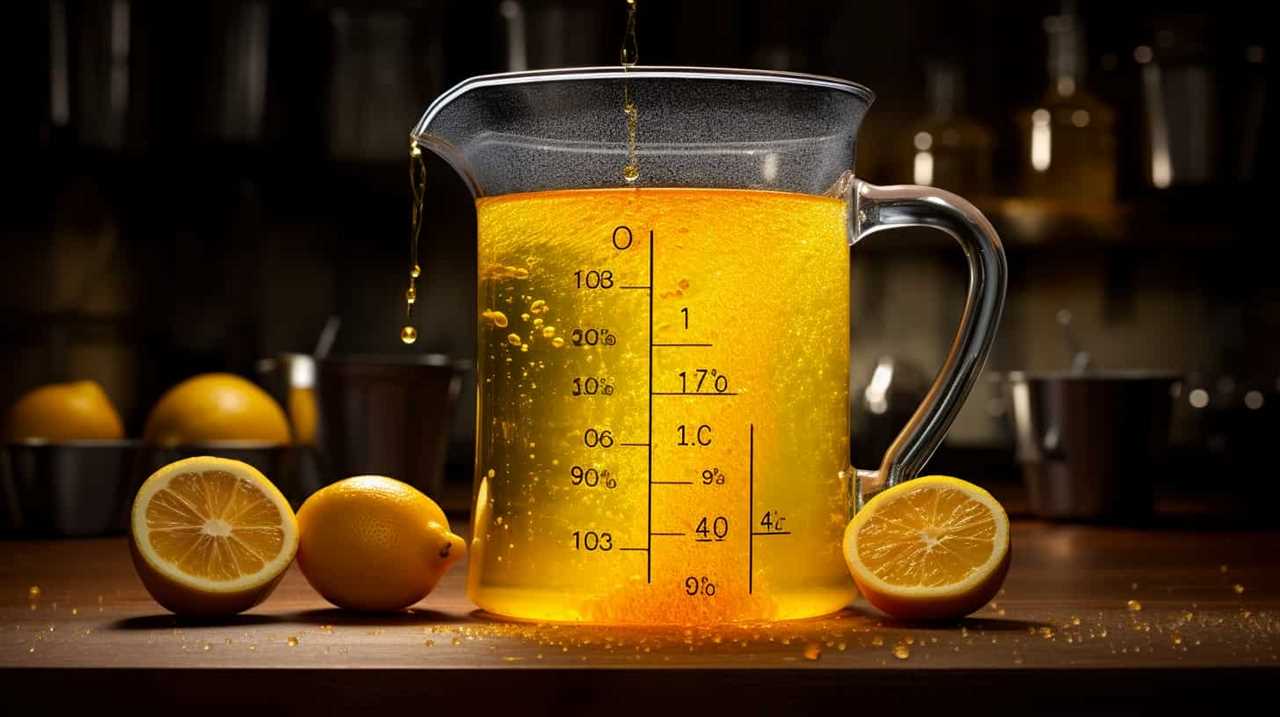
It’s important to note that while some natural variations in scent can occur due to the specific variety of oranges used, any strong or unpleasant smells should raise concerns. If you have citrus fruit allergies, it’s especially important to pay attention to the smell of orange juice, as it could indicate the presence of spoilage or contamination.
Ensuring the quality of orange juice is essential as it’s a popular beverage known for its health benefits, including being rich in vitamin C and antioxidants.
Off Taste of Orange Juice
Our taste buds can detect even the slightest hint of an off taste in orange juice, which can indicate that it has gone bad. The taste of orange juice should be fresh, tangy, and slightly sweet. If it tastes sour, bitter, or fermented, it’s likely spoiled.
One common cause of an off taste in orange juice is the use of overripe oranges. When oranges become overripe, their flavor profile changes, resulting in a less pleasant taste. Another factor to consider is the expiration date. Orange juice that has passed its expiration date is more likely to develop an off taste. It’s important to check the expiration date before consuming orange juice to ensure its freshness and quality.
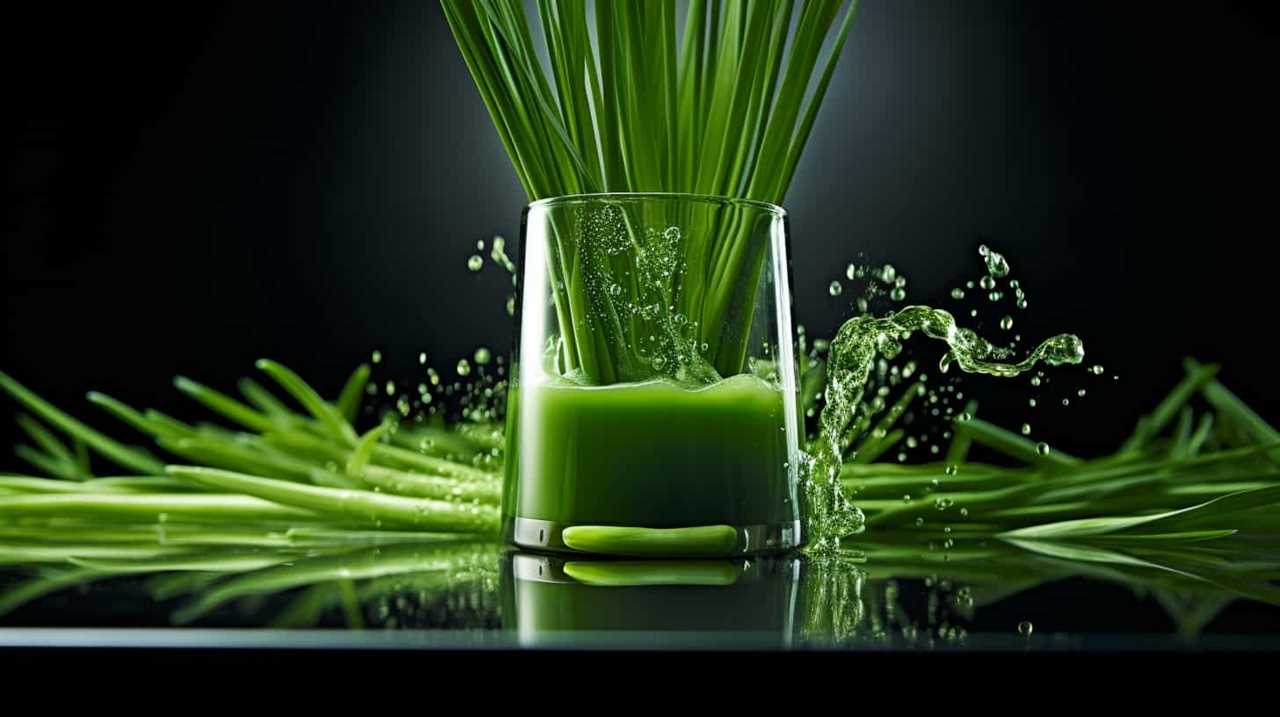
Now, let’s move on to discuss the texture changes in orange juice.
Texture Changes in Orange Juice
As we explore the texture changes in orange juice, it’s important to note that certain factors can cause it to become thicker or develop sediment. One common texture change in orange juice is pulp separation, where the pulp separates from the liquid and settles at the bottom. This can occur naturally over time, as the pulp particles become denser and sink.
Another factor that can affect the texture of orange juice is the expiration date. As orange juice ages, it may start to develop a thicker consistency and even form sediment. This is a result of the natural breakdown of the juice’s components. Therefore, it’s crucial to check the expiration date on orange juice and consume it before it reaches its expiration date to avoid any undesirable texture changes.
Mold or Growth in Orange Juice
We need to be aware of the possibility of mold or other growth occurring in orange juice. Mold can develop in orange juice if it isn’t stored properly or if it has passed its expiration date.
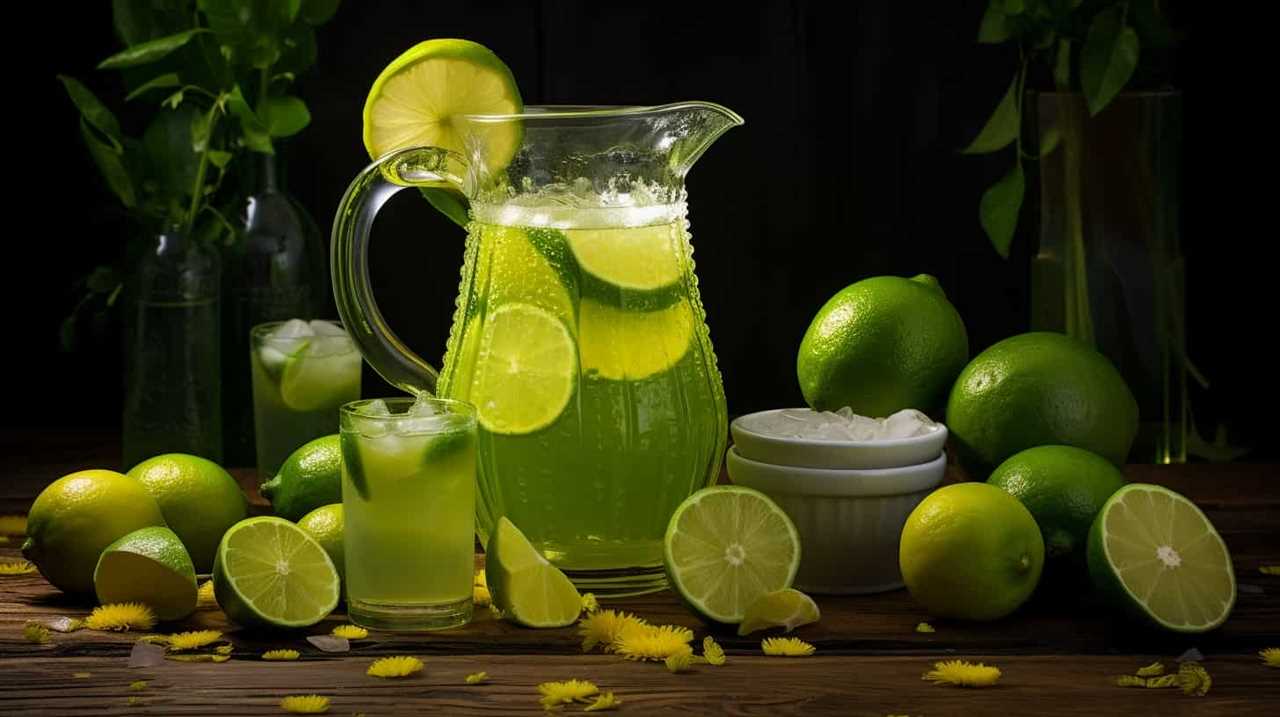
To prevent mold growth, it’s important to follow these steps:
- Store orange juice in the refrigerator at a temperature below 40°F (4°C).
- Check the expiration date on the bottle before consuming. Discard any orange juice that has expired.
- Keep the container tightly sealed to prevent air and moisture from entering, as these can promote mold growth.
Regularly inspecting orange juice for any signs of mold or unusual growth is essential. If you notice any discoloration, a strange odor, or visible mold, it’s best to discard the juice to avoid any potential health risks.
Frequently Asked Questions
Can Orange Juice Go Bad if It’s Stored in the Freezer for Too Long?
Frozen orange juice can potentially lose its nutrients and change its taste if stored in the freezer for too long. It is important to check for signs of spoilage before consuming it.
How Long Can Orange Juice Stay Fresh in the Refrigerator Once It’s Opened?
Once opened, orange juice can stay fresh in the refrigerator for about 7-10 days. To maintain its freshness, store it properly by keeping it tightly sealed and at a consistently cold temperature.
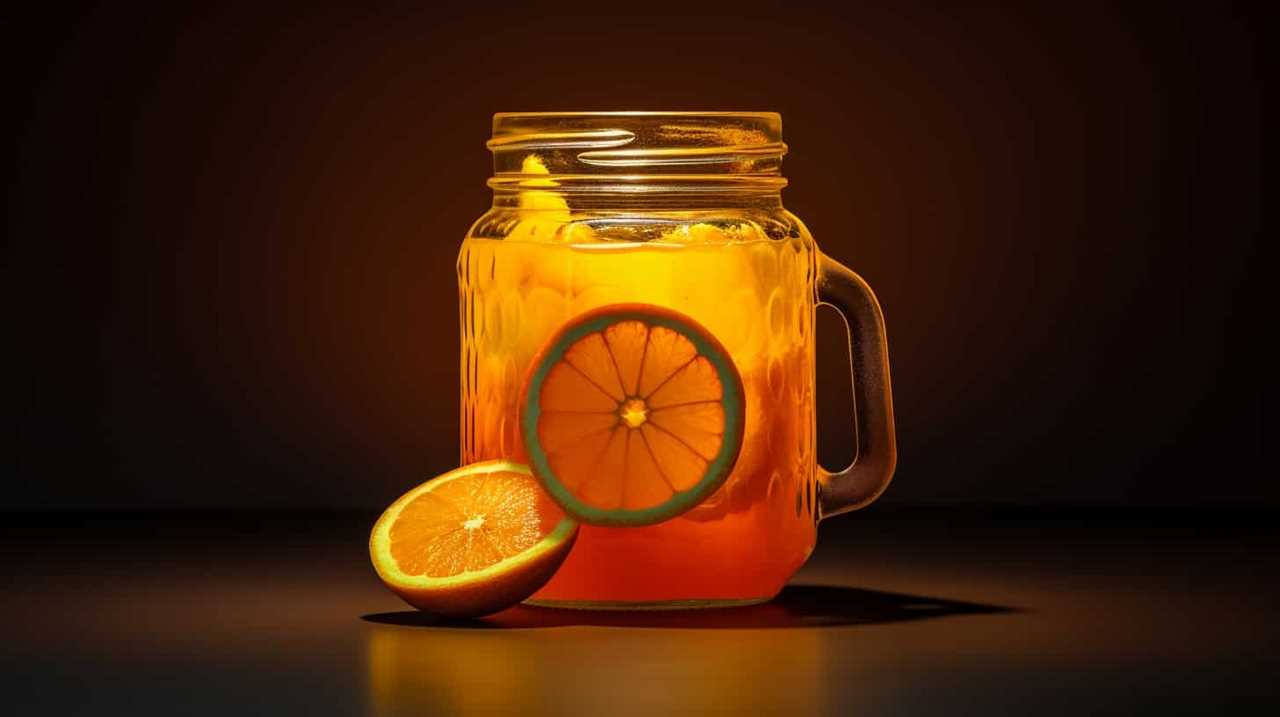
Is It Safe to Consume Orange Juice That Has Been Left Out at Room Temperature Overnight?
Left out orange juice may not be safe to drink as it can harbor harmful bacteria. Signs of spoiled orange juice include a sour smell, mold growth, and a change in color or taste.
Can Orange Juice Develop Harmful Bacteria if It’s Past Its Expiration Date but Still Looks and Smells Fine?
Orange juice can cause food poisoning if it develops harmful bacteria, even if it looks and smells fine. Signs of spoiled orange juice include a sour smell, mold growth, and a change in color or taste.
Does the Nutritional Value of Orange Juice Decrease as It Starts to Go Bad?
As orange juice goes bad, its nutritional value decreases. The longer it sits on the shelf, the more nutrients it loses. Signs of spoilage include a sour smell, off taste, and mold growth.
Conclusion
In conclusion, determining if orange juice is bad requires careful observation of color changes, strange smells, off taste, and texture changes. Just like a detective investigating a case, we must rely on our senses to detect any signs of spoilage.
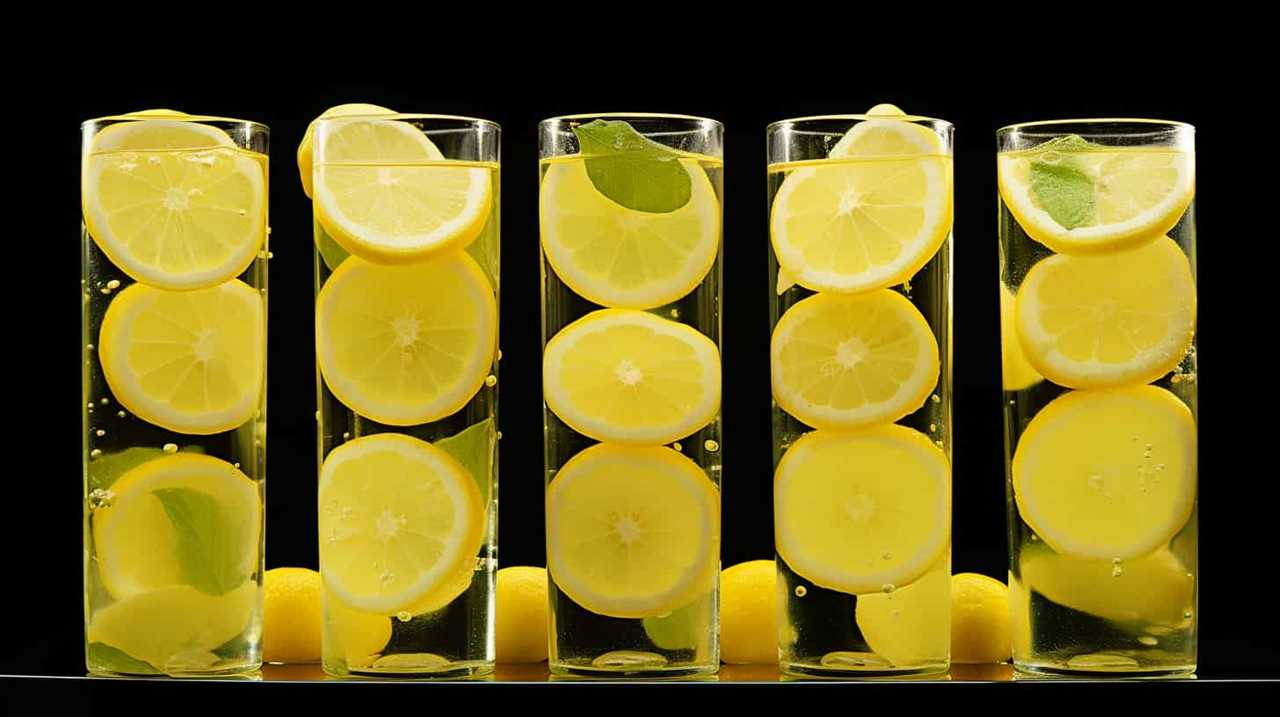
If we detect mold or growth in the orange juice, it’s a clear indication that it’s no longer safe to consume. By remaining vigilant and attuned to these indicators, we can ensure that our orange juice is always fresh and enjoyable.
Susannah expertise lies in researching and compiling evidence-based content on juicing, nutrition, and overall health. She is committed to ensuring that The Juicery World offers accurate, up-to-date, and trustworthy information to empower readers to take control of their health. Susannah’s goal is to inspire individuals to embrace juicing as a way to nourish their bodies and live their best lives.
-

 Juice Tips and Tricks2 months ago
Juice Tips and Tricks2 months agoHow To Make Homemade Pickle Juice
-

 Juice Tips and Tricks2 months ago
Juice Tips and Tricks2 months agoHow Much Lemon Juice Is Equal To Half A Lemon
-

 Health Benefits of Juice3 months ago
Health Benefits of Juice3 months agoHow Much Bottled Lemon Juice Equals 1 Lemon
-

 Juice Tips and Tricks2 months ago
Juice Tips and Tricks2 months agoHow Much Lemon Juice Concentrate Equals One Lemon
-

 Juice Tips and Tricks2 months ago
Juice Tips and Tricks2 months agoHow Long Can You Drink Orange Juice After The Expiration Date
-

 Juice Tips and Tricks3 months ago
Juice Tips and Tricks3 months agoHow Long Does Lemon Juice Last After Expiration Date
-

 Fruit Juice Varieties1 month ago
Fruit Juice Varieties1 month agoTop 11 Most Loved Fruit Juice Varieties
-

 Juice Tips and Tricks2 months ago
Juice Tips and Tricks2 months agoHow Much Lemon Juice Is Equivalent To 1 Lemon





